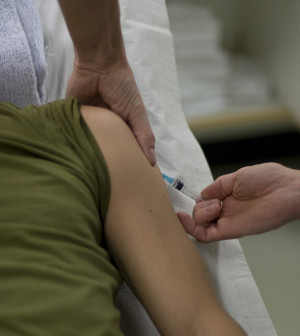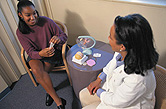- Skip Storing This Everyday Product in the Fridge Door
- Green Tea + B3 Pairing May Boost Brain Health
- Navigating Your Midlife Crisis: Embracing New Possibilities
- City Raccoons Showing Signs of Domestication
- Mapping the Exposome: Science Broadens Focus to Environmental Disease Triggers
- One Week Less on Social Media Linked to Better Mental Health
- Your Brain Changes in Stages as You Age, Study Finds
- Some Suicide Victims Show No Typical Warning Signs, Study Finds
- ByHeart Formula Faces Lawsuits After Babies Sickened With Botulism
- Switch to Vegan Diet Could Cut Your Greenhouse Gas Emissions in Half
Black Women Less Likely to Get HPV Vaccine: Study


FRIDAY, Aug. 30New research finds that black women are less likely to get vaccinated against the human papillomavirus (HPV), a sexually transmitted infection that can cause cervical cancer.
“The HPV vaccine is a first line of defense to protect against cervical cancer,” senior study author Dr. Sonya Borrero, an assistant professor of medicine at the University of Pittsburgh School of Medicine, said in a university news release. “Given that cervical cancer is more common and associated with higher mortality in African-American and Hispanic women than in white women, it is especially important to understand the barriers to HPV vaccination for these populations.”
About 12,000 cases of cervical cancer connected to HPV are diagnosed in the United States each year, according to the U.S. Centers for Disease Control and Prevention. Two vaccines are now available, and are recommended for all teens and young women.
The researchers examined statistics from a 2006 to 2010 national survey of nearly 2,200 females aged 15 to 24. Although one-third of white females said they’d at least started taking the vaccine (which is given in three shots), only 18 percent of black women said they had. The disparity persisted, regardless of income or access to health care. In contrast, those factors played a significant role in whether Hispanics received the vaccine.
“Our findings in African-Americans suggest that there are other unmeasured patient- or provider-level factors contributing to under-vaccination, and that alternate strategies need to be identified to increase HPV vaccination among African-Americans,” Borrero said. “Further efforts are needed to understand how to overcome the patient-, parent- and provider-level barriers that hamper widespread uptake for this effective and safe vaccine.”
The study was published Aug. 27 in the Journal of Adolescent Health.
More information
For more about HPV, try the U.S. National Library of Medicine.
Source: HealthDay
Copyright © 2025 HealthDay. All rights reserved.










